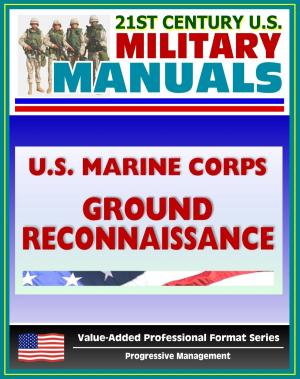21st Century U.S. Military Manuals: U.S. Marine Corps (USMC) Logistics - Marine Corps Doctrinal Publication (MCDP) 4 (Value-Added Professional Format Series)
Nonfiction, History, Military, Naval, Social & Cultural Studies, Political Science| Author: | Progressive Management | ISBN: | 9781466047341 |
| Publisher: | Progressive Management | Publication: | February 11, 2012 |
| Imprint: | Smashwords Edition | Language: | English |
| Author: | Progressive Management |
| ISBN: | 9781466047341 |
| Publisher: | Progressive Management |
| Publication: | February 11, 2012 |
| Imprint: | Smashwords Edition |
| Language: | English |
Part of our value-added professional format series of U.S. military manuals, this U.S. Marine Corps manual covers logistics operations.
Marine Corps Doctrinal Publication (MCDP) 4, Logistics, describes the theory and philosophy of military logistics as practiced by the United States Marine Corps. It provides all Marines a conceptual framework for the understanding and practice of effective logistics. The Marine Corps' view of logistics is based on our common understanding of the nature of war and on our warfighting philosophy as described in MCDP 1, Warfighting. Our doctrine recognizes that logistics is an integral part of warfighting. Logistics provides the resources of combat power, brings those resources to the battle, and sustains them throughout the course of operations. Our approach to logistics recognizes that war is conducted in an environment of complexity, fluidity, disorder, and uncertainty and seeks to provide the commander with the physical means to win in this environment. Our logistic capabilities extend our operational limits, allowing us to anticipate requirements while remaining flexible, adaptable, and responsive to changing conditions in the battlespace. Chapter 1 is based upon the assumption that in order to develop an effective philosophy of logistics, we must first develop a realistic understanding of the nature of logistics. Based upon this understanding, chapter 2 discusses the theoretical aspects of logistics. Building upon the conclusions of the preceding chapters, chapter 3 describes the basic approach of the Marine Corps to logistics.
As a bonus, this reproduction includes the Marine Corps Manual, the basic publication of the United States Marine Corps issued by the Commandant of the Marine Corps and approved by the Secretary of the Navy - sold separately for $7.99. It is a regulatory publication for the Department of the Navy as defined in U.S. Navy Regulations. The Marine Corps Manual is designed primarily for use by Marine Corps commanders and their staffs, Navy officers exercising command over Marines, the staff of the Commandant of the Marine Corps, and the staffs of the bureaus and offices of the Navy Department. Contents: Chapter 1 - General Administration And Management * Chapter 2 - Manpower * Chapter 3 - Operations And Readiness * Chapter 4 - Logistics
The manual describes the Marine Corps mission and functions: The Marine Corps shall be organized, trained, and equipped to: (1) Provide Fleet Marine Forces of combined arms, together with supporting air components, for service with the United States Fleet in the seizure or defense of advanced naval bases and for the conduct of such land operations as may be essential to the prosecution of a naval campaign. (2) Provide detachments and organizations for service on armed vessels of the Navy, and security detachments for the protection of naval property at naval stations and bases. (3) Develop, in coordination with the Army, Navy, and Air Force, the doctrines, tactics, techniques, and equipment employed by landing forces in amphibious operations. The Marine Corps shall have primary interest in the development of those landing force doctrines, tactics, techniques, and equipment which are of common interest to the Army and the Marine Corps.
Part of our value-added professional format series of U.S. military manuals, this U.S. Marine Corps manual covers logistics operations.
Marine Corps Doctrinal Publication (MCDP) 4, Logistics, describes the theory and philosophy of military logistics as practiced by the United States Marine Corps. It provides all Marines a conceptual framework for the understanding and practice of effective logistics. The Marine Corps' view of logistics is based on our common understanding of the nature of war and on our warfighting philosophy as described in MCDP 1, Warfighting. Our doctrine recognizes that logistics is an integral part of warfighting. Logistics provides the resources of combat power, brings those resources to the battle, and sustains them throughout the course of operations. Our approach to logistics recognizes that war is conducted in an environment of complexity, fluidity, disorder, and uncertainty and seeks to provide the commander with the physical means to win in this environment. Our logistic capabilities extend our operational limits, allowing us to anticipate requirements while remaining flexible, adaptable, and responsive to changing conditions in the battlespace. Chapter 1 is based upon the assumption that in order to develop an effective philosophy of logistics, we must first develop a realistic understanding of the nature of logistics. Based upon this understanding, chapter 2 discusses the theoretical aspects of logistics. Building upon the conclusions of the preceding chapters, chapter 3 describes the basic approach of the Marine Corps to logistics.
As a bonus, this reproduction includes the Marine Corps Manual, the basic publication of the United States Marine Corps issued by the Commandant of the Marine Corps and approved by the Secretary of the Navy - sold separately for $7.99. It is a regulatory publication for the Department of the Navy as defined in U.S. Navy Regulations. The Marine Corps Manual is designed primarily for use by Marine Corps commanders and their staffs, Navy officers exercising command over Marines, the staff of the Commandant of the Marine Corps, and the staffs of the bureaus and offices of the Navy Department. Contents: Chapter 1 - General Administration And Management * Chapter 2 - Manpower * Chapter 3 - Operations And Readiness * Chapter 4 - Logistics
The manual describes the Marine Corps mission and functions: The Marine Corps shall be organized, trained, and equipped to: (1) Provide Fleet Marine Forces of combined arms, together with supporting air components, for service with the United States Fleet in the seizure or defense of advanced naval bases and for the conduct of such land operations as may be essential to the prosecution of a naval campaign. (2) Provide detachments and organizations for service on armed vessels of the Navy, and security detachments for the protection of naval property at naval stations and bases. (3) Develop, in coordination with the Army, Navy, and Air Force, the doctrines, tactics, techniques, and equipment employed by landing forces in amphibious operations. The Marine Corps shall have primary interest in the development of those landing force doctrines, tactics, techniques, and equipment which are of common interest to the Army and the Marine Corps.















